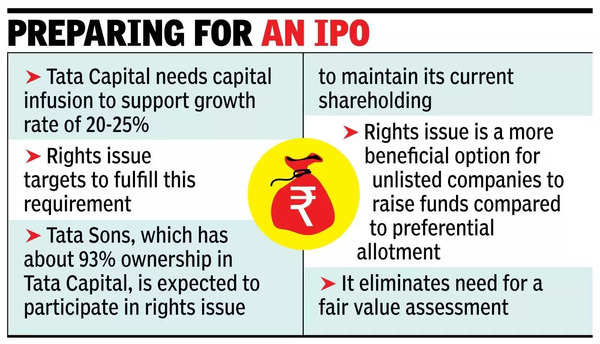Tata Capital board to look at potential fund-raise
MUMBAI: The board of Tata Capital, which is preparing for an initial public offering (IPO), will meet on Tuesday to discuss a potential fund-raise through a rights issue. The Reserve Bank of India has classified Tata Capital as an upper-layer non-banking financial services company (NBFC) and has directed the firm to list its shares by September. Tata Sons, which has about 93% ownership in Tata Capital, is expected to participate in the rights issue to maintain its current shareholding in the NBFC.
Tata Capital requires consistent capital infusion to support its growth rate of 20-25%, and the rights issue aims to fulfill this requirement, said a person familiar with the matter. The remaining 7% ownership in Tata Capital is distributed among various Tata Group entities, select executives from both Tata Group and external organisations, and the Washington-based International Finance Corporation.

A rights issue is a more beneficial option for unlisted companies to raise funds compared to preferential allotment, as it eliminates the requirement for fair value assessment. The main advantage lies in its uniform pricing structure, where all existing shareholders must subscribe to new shares at the same price, said Katalyst advisors’ executive director Binoy Parikh.
Tata Capital’s proposed fund-raise through a rights issue follows recent changes to its memorandum of association (MoA) and articles of association (AoA). The company, in its January communication to shareholders requesting approval for MoA and AoA amendments, disclosed having around 29,000 shareholders.
To comply with sections 25 and 42 of the Companies Act and prevent further expansion of its shareholder base through corporate actions, Tata Capital said it has introduced a new provision in its AoA to restrict shareholders from renouncing their rights in rights issues until the company’s equity shares are listed on the stock exchanges. It clarified that this restriction does not prevent existing shareholders from participating in or subscribing to additional equity shares through rights issues.
Tata Capital is the largest financial services entity within the Tata Group and is identified as a crucial element for growth by the conglomerate. The proposed IPO, which could involve the issuance of new shares, could result in a reduction of Tata Sons’ ownership by about 5%. According to listing regulations, companies must maintain a 25% public shareholding within three years post-listing.
In a note dated February 5, Fitch Ratings said that Tata Sons’ ownership in Tata Capital is unlikely to fall below 75% after the proposed public listing. The IPO will strengthen Tata Capital’s capital base and decrease its leverage further, Fitch said, adding that the NBFC’s debt-to-tangible equity ratio has shown improvement, declining to 6.3x by the conclusion of 1HFY25, compared to 7.2x at the end of FY22.

